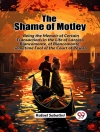In ‘The Earl of Essex, ‘ Henry Jones crafts a richly layered narrative that delves into the life of Robert Devereux, the second Earl of Essex, a figure of considerable historical significance. Jones masterfully intertwines historical fact with creative storytelling, employing a poetic literary style that evokes the Elizabethan era’s complexities. The text explores themes of ambition, rebellion, and the volatile relationship between the court and its ambitious members, set against the tumultuous backdrop of England during Queen Elizabeth I’s reign. Through vivid characterizations and evocative imagery, Jones invites readers to engage with the intricacies of power dynamics and personal desire. Henry Jones, an acclaimed historian and dramatist with a deep passion for Elizabethan history, draws upon extensive research and firsthand accounts to breathe life into the pages of this compelling biography. His understanding of the socio-political landscape of the time is augmented by his background in both literary and historical discourse, allowing him to provide a nuanced portrayal of Essex’s controversial legacy. Jones’s exploration of Essex’s rise and fall offers profound insights into the nature of ambition and the price of loyalty. For readers captivated by historical fiction that illuminates the complexities of human nature and ambition, ‘The Earl of Essex’ stands out as a must-read. It not only enriches one’s understanding of Elizabethan history but also provides a gripping narrative that resonates with contemporary themes of power and identity. This scholarly yet accessible work is highly recommended for lovers of history, literature, and drama alike.
Giới thiệu về tác giả
Henry Jones, a scholar with an enriching background in the nuances of English history and literature, stands as an authoritative voice on the Elizabethan era. His seminal work, ‘The Earl of Essex, ‘ delves into the complex and turbulent life of one of Queen Elizabeth I’s most enigmatic courtiers. Jones’s literary style is marked by meticulous research and an evocative narrative that brings the political intrigues and personal triumphs and tragedies of the period to life. His mastery in weaving historical fact with storytelling has not only enlightened readers but also contributed significantly to the understanding of the socio-political dynamics of the late 16th century. Jones’s academic rigor is evident in his detailed examination of Robert Devereux, the 2nd Earl of Essex, displaying a nuanced interpretation of the Earl’s relationship with the Queen and his eventual downfall. Despite the general popularity of Tudor history, Jones manages to offer new insights, drawing from a variety of primary sources, which demonstrate his exemplary scholarship and dedication to historical accuracy. His work is an indispensable resource for both history enthusiasts and scholars interested in the complexities of court life and the interplay of personal ambition and public service in Renaissance England.












